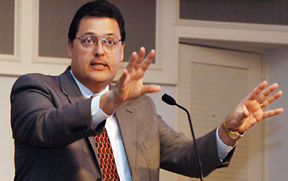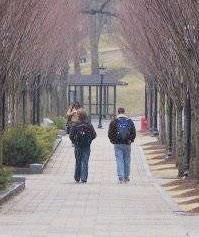DOWN HOME: Pucker up for some really good news
Posted: 3/30/07
DOWN HOME:
Pucker up for some really good news
Now, here’s some useful news:
Kissing is good for you.
And I’m not making this up.
Heart-Healthy Living magazine puts it out there in black and white in its spring issue. “Couples who kiss often are eight times less likely to feel stressed or depressed.” Ta-da!
OK, for those of you who are more peeved by bad syntax than excited by the prospect of kissing, the magazine didn’t say “eight times less likely” than what. We would assume “eight times less likely” than nonkissers and infrequent kissers. It also didn’t define “often,” but that’s a highly subjective word, anyway.
A smooching survey of 3,300 Americans conducted for the Chicago-based Berman Center documented the benefits of bussing.
Most women I know will be glad to learn the most stress-reducing, anti-depressing kind of kissing is “done for its own sake, not as a prelude to something else,” the magazine declared.
“And it’s not just a peck on the cheek we’re talking about. It’s more about spending some time canoodling,” reported Laura Berman, president and director of the center that bears her name. “If you’re doing it right, you’ll elicit squeals and groans from your kids.”
Maybe one reason kissing lowers stress and cures depression is because it improves relationships.
Author René Yasenek gets the idea, explaining, “Kissing is a means of getting two people so close together that they can’t see anything wrong with each other.”
Now, if you’re feeling depressed because you haven’t been puckering up much lately, or if you don’t have a clue what “canoodling” means, Berman offers a prescription for remedial lip-locking. Each time you or your spouse leaves the house, say goodbye with a 10-second kiss.
“If you’re like most couples, you’ll see that 10 seconds seems like a really long time at first,” Berman concedes. But maybe that’s like driving to a new place; the trip always seems longer the first time.
In a semi-related development, the Today show reported most guys actually like so-called chick flicks. These are the boy-meets-girl, boy-does-dumb-stunt-and-loses-girl, girl-helps-boy-see-the-error-of-his-ways, boy-gets-girl-again movies.
Most of them are sappy and unrealistic. And most of them include at least some kissing but no nekkidness.
When surveyed, a majority of men said chick flicks are at least “OK.” (Sorry; I don’t have statistics. I was shaving in a hotel room when Meredith Viera broke the happy news.)
Guys like these movies precisely because they make their chicks happy. Sorta like kissing “for its own sake.”
Of course, if you were to try to describe precisely why kissing is so good for you, you probably couldn’t do it. Not without singing, anyway.
But that’s just one of the mysteries of God’s wonderful creation.
—Marv Knox
News of religion, faith, missions, Bible study and Christian ministry among Baptist churches, in Texas, the BGCT, the nation and around the world.




